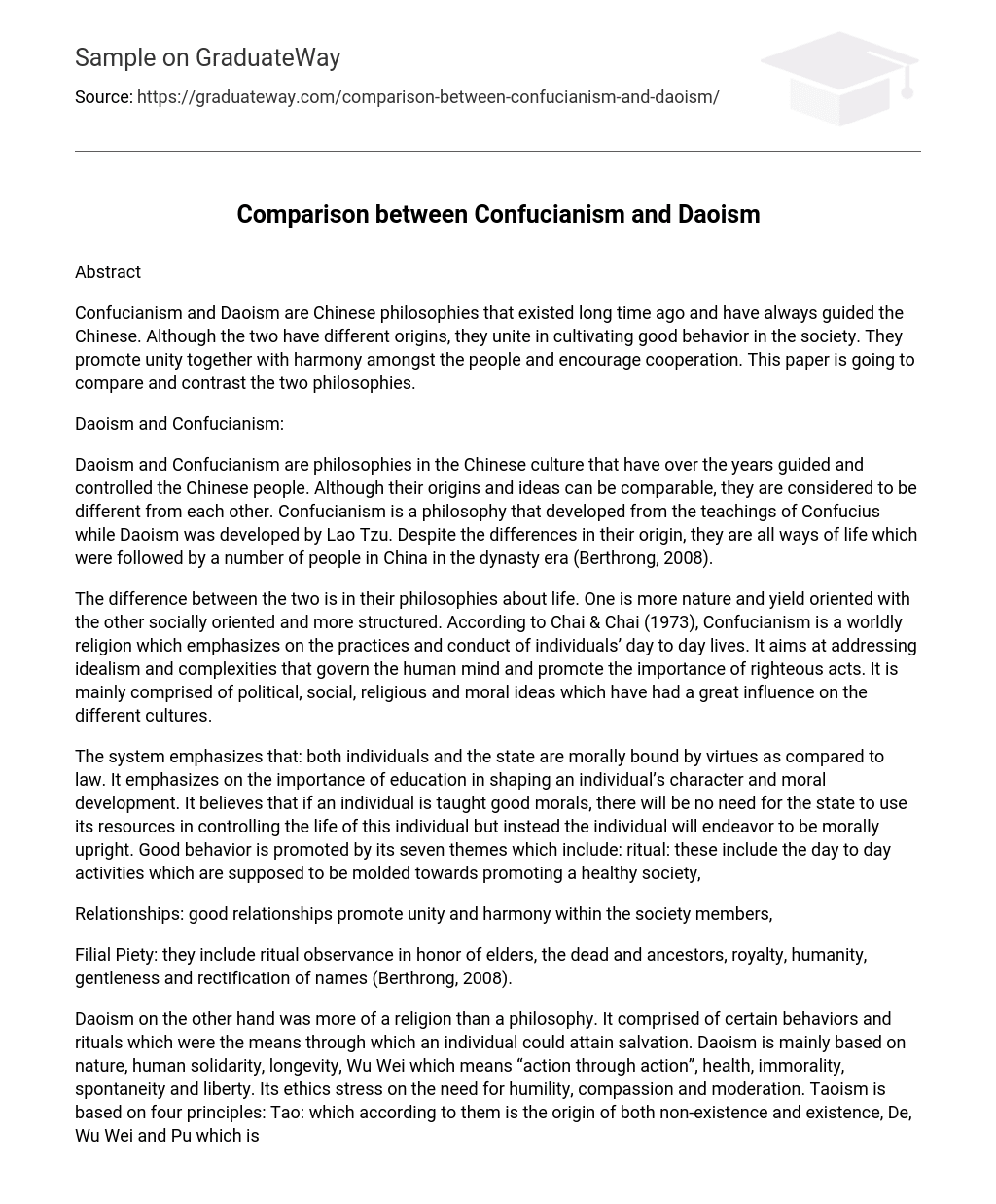Abstract
Confucianism and Daoism are Chinese philosophies that existed long time ago and have always guided the Chinese. Although the two have different origins, they unite in cultivating good behavior in the society. They promote unity together with harmony amongst the people and encourage cooperation. This paper is going to compare and contrast the two philosophies.
Daoism and Confucianism:
Daoism and Confucianism are philosophies in the Chinese culture that have over the years guided and controlled the Chinese people. Although their origins and ideas can be comparable, they are considered to be different from each other. Confucianism is a philosophy that developed from the teachings of Confucius while Daoism was developed by Lao Tzu. Despite the differences in their origin, they are all ways of life which were followed by a number of people in China in the dynasty era (Berthrong, 2008).
The difference between the two is in their philosophies about life. One is more nature and yield oriented with the other socially oriented and more structured. According to Chai & Chai (1973), Confucianism is a worldly religion which emphasizes on the practices and conduct of individuals’ day to day lives. It aims at addressing idealism and complexities that govern the human mind and promote the importance of righteous acts. It is mainly comprised of political, social, religious and moral ideas which have had a great influence on the different cultures.
The system emphasizes that: both individuals and the state are morally bound by virtues as compared to law. It emphasizes on the importance of education in shaping an individual’s character and moral development. It believes that if an individual is taught good morals, there will be no need for the state to use its resources in controlling the life of this individual but instead the individual will endeavor to be morally upright. Good behavior is promoted by its seven themes which include: ritual: these include the day to day activities which are supposed to be molded towards promoting a healthy society,
Relationships: good relationships promote unity and harmony within the society members,
Filial Piety: they include ritual observance in honor of elders, the dead and ancestors, royalty, humanity, gentleness and rectification of names (Berthrong, 2008).
Daoism on the other hand was more of a religion than a philosophy. It comprised of certain behaviors and rituals which were the means through which an individual could attain salvation. Daoism is mainly based on nature, human solidarity, longevity, Wu Wei which means “action through action”, health, immorality, spontaneity and liberty. Its ethics stress on the need for humility, compassion and moderation. Taoism is based on four principles: Tao: which according to them is the origin of both non-existence and existence, De, Wu Wei and Pu which is perceived to be “an inactive stage of receptiveness”. They believed that things happen in cycles and that each and every thing had to have its point of origin. They also believed in peace, mediation and passivity (Guo, 2002).
Although the two were different in some aspects, they both tried to introduce appropriate behaviors which people were expected to follow. Daoism and Confucianism also agree that all people are born good and deserve to be rewarded by their governments and not being punished. Despite the different distinctive features in each of the philosophies, the two complemented each other and it was believed that for one to be considered complete: he/she had to measure up to the two philosophies.
It can therefore be concluded that: although the two philosophies may have different ideologies, they are equally important to Chinese people. They have different views on human life but they also tie in different aspects.
Reference
Berthrong, H. J., (2008). Expanding process: exploring philosophical and theological transformations in China and the West. New York: SUNY Press.
Chai, C. & Chai W. (1973). Confucianism. Woodbury, NY: Barron’s Educational Series.
Guo, X., (2002). The ideal Chinese political leader: a historical and cultural perspective. Santa Barbara, CA: Greenwood Publishing Group.





